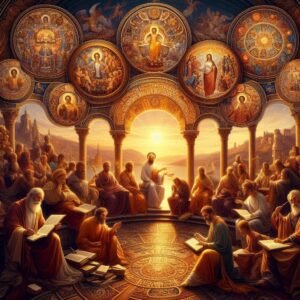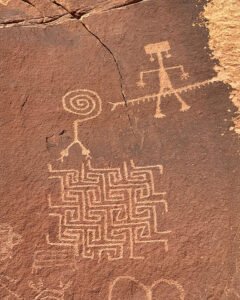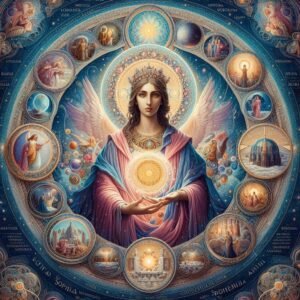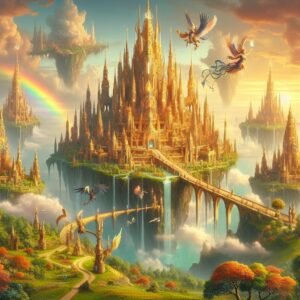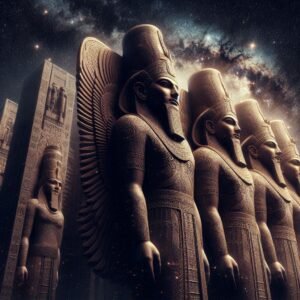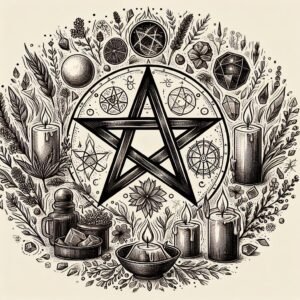
The Christian Creation myth, as recounted in the Book of Genesis, begins with the profound declaration, “In the beginning, God created the heavens and the earth.” This opening line sets the stage for a narrative that unfolds over six days of creation, culminating in the rest of the seventh day. On the first day, God summons light into existence, separating it from darkness. The second day sees the formation of the sky as a divider between the waters above and below. Land and vegetation emerge on the third day, followed by the celestial bodies on the fourth day to mark time and seasons. The fifth day fills the seas and skies with living creatures, and the sixth day brings forth land animals and humankind, made in the image of God. Each step of creation is deemed good by God, reflecting a divine satisfaction with the unfolding cosmos.
The narrative is not just a chronological account but also carries a deeper moral and spiritual significance. It portrays a universe intricately crafted by a purposeful and orderly deity. The creation story is not concerned with the scientific specifics of how the universe came to be but rather with the theological implications of a world created by a sovereign and benevolent God. This is evident in the repeated affirmation that God saw His creation as “good,” and in the sanctification of the seventh day as a day of rest, setting a precedent for the Sabbath tradition observed in Judeo-Christian cultures.
The Genesis narrative has been the subject of extensive theological discussion and interpretation throughout Christian history. It has been explored in various commentaries, such as those by early Church Fathers and contemporary theologians. The narrative’s influence extends beyond religious texts, inspiring art, literature, and cultural discourse on the relationship between God, humanity, and the natural world.
For those seeking a more profound understanding of the Christian Creation myth, several resources provide insightful analysis and commentary. The summary and study guide on Learn Religions offers a day-by-day breakdown of the creation process, emphasizing the simplicity and faith-based perspective of the narrative. BBC Bitesize presents an accessible overview tailored for educational purposes, highlighting the responsibilities bestowed upon humanity to care for creation. Wikipedia’s entry on the Genesis creation narrative provides a comprehensive look at the myth’s context within both Judaism and Christianity, detailing the two distinct creation stories present in the first chapters of Genesis.
The Christian Creation myth is a foundational narrative that has shaped religious belief and practice. It is a story that invites reflection on the origins of the universe and the human place within it, encouraging a stewardship role towards the Earth and its inhabitants. The myth serves as a reminder of the divine love and intentionality behind creation, offering a lens through which to view the natural world and our part in its ongoing story.
Differences with other creation myths
The Genesis creation story is distinct in several key aspects when compared to other cultural creation myths. One of the primary differences is its monotheistic perspective, which attributes the creation of the universe to a single, omnipotent God. This contrasts with many other myths that often feature a pantheon of gods and goddesses, each with specific roles in the creation process. For instance, the Enuma Elish, a Babylonian creation myth, involves a cosmic battle between gods, leading to the formation of the world from the defeated chaos monster Tiamat.
Another difference lies in the ordered and methodical approach of the Genesis narrative, where creation unfolds over six days with a clear sequence and purpose for each act of creation. This is unlike some myths where the world comes into being through more chaotic or spontaneous means, such as the hatching of a cosmic egg in Chinese mythology or the emergence of life from a primordial abyss in various indigenous narratives.
The Genesis account also emphasizes the concept of humans being created in the image of God, giving them a unique status and dominion over the earth. This anthropocentric view is less pronounced in other myths, where humans are often one of many creations, not necessarily central to the purpose of creation itself.
Furthermore, the Genesis story introduces the concept of the Sabbath, a day of rest on the seventh day, which is a unique element not found in other creation myths. This marks the completion of creation and sets a pattern for human behaviour and religious practice.
The narrative’s focus on morality, exemplified by the story of Adam and Eve and the forbidden fruit, introduces the theme of obedience and sin, which shapes the human condition. Other myths may not address the moral dimensions of human actions or the consequences of disobeying the divine as directly as the Genesis story does.
While there are thematic overlaps between the Genesis creation story and other cultural myths, such as the emergence of order from chaos and the importance of water and light, the differences are marked by the narrative’s monotheism, structured creation process, anthropocentrism, introduction of the Sabbath, and moral themes. These distinctions reflect the unique theological and cultural perspectives of the Judeo-Christian tradition as captured in the Genesis account.
Common themes in creation myths
Creation myths from various cultures share a tapestry of common themes, despite the diversity of their narratives and the uniqueness of their cultural contexts. A prevalent theme is the emergence of order from chaos, where the cosmos is often depicted as originating from a state of disarray or nothingness, moving towards a structured existence. This motif resonates in myths where the universe is born from a primordial abyss or a cosmic egg, symbolizing potentiality and the birth of life.
Another recurring element is the divine act of creation, where a supreme being or beings bring the world into existence. This can manifest as a single creator in monotheistic traditions or a pantheon of deities, each contributing to the creation in polytheistic stories. The act of creation itself is frequently seen as a series of stages or a succession of creative acts, with each day or epoch introducing new elements into the world, such as light, land, flora, fauna, and ultimately, humans.
The theme of dualism is also significant, often represented by the separation of sky and earth, light and darkness, or the division of waters, establishing the fundamental dichotomies that define the physical universe. This separation sets the stage for the balance and harmony that many cultures perceive in the natural order.
The creation of humanity holds a special place in these myths, with humans typically fashioned from the earth or other natural materials, signifying a deep connection to the world. The human creation often entails a breath of life or divine spark, endowing humans with a soul or consciousness, setting them apart from other creatures.
The motif of a cosmic battle or struggle is common, where creation is achieved through conflict, either between gods or against a personification of chaos. This struggle underscores the value of order and the effort required to maintain it.
Finally, many creation myths culminate in a sacred rest or a period of tranquillity, reflecting a completed creation and the establishment of a cyclical pattern of time, such as the Sabbath in the Judeo-Christian tradition or similar concepts in other cultures.
These themes are not only foundational narratives about the origins of the world but also reflect the values, ethics, and cosmological understanding of the societies that cherish them. They provide a framework for interpreting the world and humanity’s role within it, often serving as a guide for moral conduct and social organization.
Differences between Jewish and Christian understandings of the Genesis story
The Jewish and Christian creation narratives are deeply intertwined, with their roots in the Book of Genesis, which serves as a foundational text for both religions. The Genesis creation narrative comprises two distinct accounts: the Priestly and the Jahwistic. The Priestly account, believed to have been composed in the 6th century BCE, presents a systematic creation of the world by a singular God in six days, followed by a day of rest, the Sabbath. This account emphasizes the omnipotence and transcendence of God, who creates through speech and order. In contrast, the Jahwistic account, which possibly dates back to the 10th century BCE, offers a more anthropomorphic depiction of God, who forms the first man, Adam, from the dust of the ground and breathes life into him. This narrative unfolds in the Garden of Eden, where Adam is joined by Eve, created from his rib.
While both accounts are present in the Christian Old Testament and the Jewish Tanakh, their interpretations and emphases can differ significantly between the two faiths. In Judaism, the creation story is often read allegorically, with a focus on the covenantal relationship between God and humanity, and the responsibilities bestowed upon humans to steward the earth. Some Jewish interpretations also delve into mystical readings of the text, exploring the nature of God and the process of creation.
Christianity, on the other hand, has historically placed a greater emphasis on the literal interpretation of the creation narrative, especially within certain denominations. The Christian reading typically underscores the doctrine of original sin, stemming from Adam and Eve’s disobedience in Eden, and the need for salvation through Jesus Christ. This interpretation is foundational to Christian theology and is reflected in various doctrinal statements and liturgical practices.
The differences in interpretation are further explored in the Hexameral literature, a genre of Jewish and Christian writings that includes commentaries and homilies on the six days of creation as described in Genesis. This body of work spans from the early Christian church fathers, like Basil of Caesarea and Augustine of Hippo, to medieval Jewish philosophers and mystics.
While the Jewish and Christian creation myths share a common textual origin, their interpretations and theological implications diverge, reflecting the distinct beliefs and practices of each religion. These differences are not just academic but have shaped the very fabric of religious identity and expression within Judaism and Christianity throughout history. For a more detailed exploration of these narratives and their interpretations, the Genesis creation narrative article on Wikipedia provides a comprehensive overview, and the BBC’s coverage on key beliefs in Judaism offers insights into the Jewish perspective of creation. Additionally, the Khan Academy provides accessible articles that discuss the Judeo-Christian origin story in a broader context.
Subscribe to our post updates - Don't miss a thing!!

